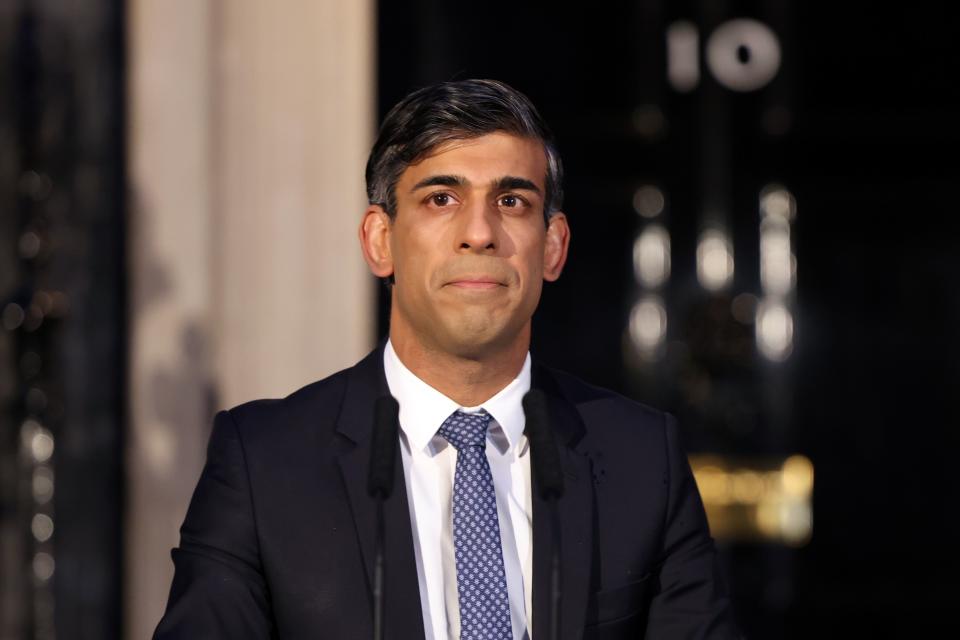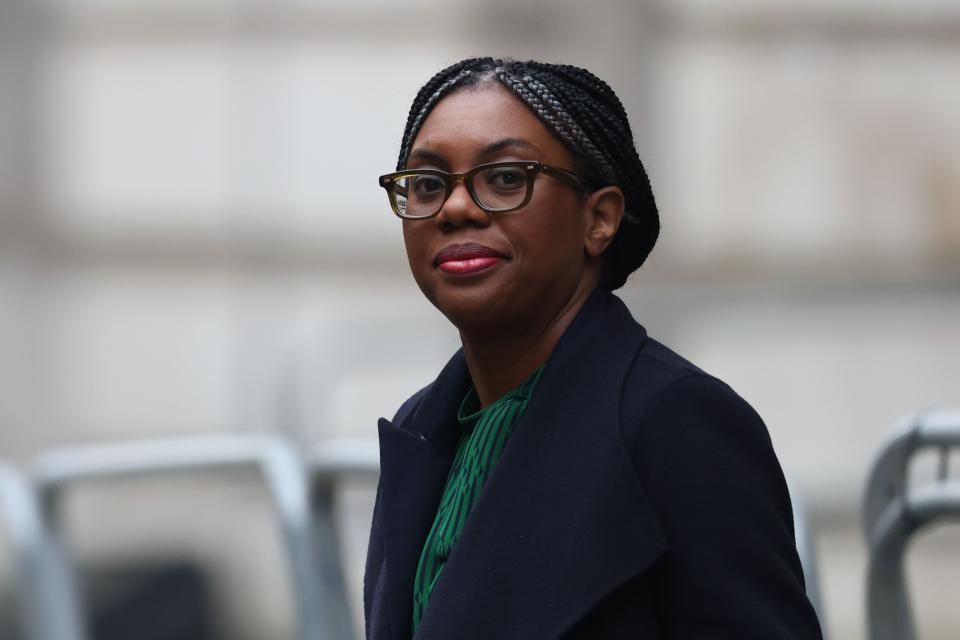Sunak Eyes Tax Cuts and an Autumn Election — If He Can Survive
(Bloomberg) -- Rishi Sunak thinks he has the makings of a plan to stave off a Conservative Party wipe-out in the upcoming UK election: another tax-cutting budget in September, with voters going to the polls in October or November. Having the chance to put it into action may be easier said than done.
Most Read from Bloomberg
Apple Is in Talks to Let Google Gemini Power iPhone AI Features
Putin Warns Russia Won’t Stop After Predictable Election Win
Musk Says His Ketamine Prescription Is in Investors’ Best Interests
That is the central scenario among political advisers working for Sunak, who this week finally ruled out holding a snap election on May 2, quelling weeks of speculation that he might call an early vote. While the election date is not decided, the prime minister’s aides believe he can leverage falling inflation, expected interest rate cuts and the fiscal headroom likely to accrue by rolling into a new forecast period to announce more pre-ballot giveaways.
Some early suggestions by advisers are radical, considering the Britain’s strained public finances and services, according to people familiar with the matter. They include a significant reduction in income tax, slashing the property stamp duty to help first-time buyers, and dramatic reforms to council tax that could even mean poorer Britons don’t have to pay the levy.
The aim, aides said, would be to trap the poll-leading opposition Labour Party by ratcheting up tax cuts to the point it has to oppose them — creating a point of division with the Tories in the campaign. Chancellor of the Exchequer Jeremy Hunt cut two percentage points off the national insurance payroll tax in two fiscal statements which Labour pledged to match — though it warned it wouldn’t support further cuts due to the damage to already crumbling public services.
Tory strategists are considering how to squeeze Labour on the issue ahead of the election, potentially by forcing it to vote against tax cuts in Parliament. That has echoes of ex-premier Boris Johnson trying to weaponize the Brexit debate ahead of the 2019 election, when he accused then leader Jeremy Corbyn and other political opponents of trying to “surrender” to the European Union.
Sunak’s office declined to comment.
But many Conservative lawmakers believe that approach will do little more than save a few seats, by jolting reluctant Tory voters to turn up on polling day. Voters may also question whether more tax cuts, without a clear picture of how public services would be affected, are a realistic plan for government.
“The problem with relying on another set piece event to turn the narrative is that these events have to capture the public mood and need not to be drowned out by other events,” said Luke Tryl, head of the More In Common think tank.
As noise about his leadership rose in Westminster this week — with even some Cabinet ministers privately doubting his position — the bigger question is rapidly becoming whether the prime minister would survive to put a plan into action. The controversies are piling up around Sunak, including racist comments allegedly said by the Tory party’s top donor, and the defection of the party’s former deputy chairman — who Sunak had promoted to help shore up his support — to the Reform UK party founded by Brexit campaigner Nigel Farage.
Even some of Sunak’s allies began to worry the risk of an organized attempt to remove him. One Tory MP described it as his worst week in office.
Doubts about Sunak’s ability to lead the party into the election have spread beyond the small group of right-wingers who’ve been agitating against him, people familiar with the matter said. There were frantic conversations among aides about how to calm the febrile mood, they said, and one supporter warned the level of disquiet would not be sustainable for months more.
Still, there’s also a prevailing view in the party that the Tories are not ready to go to the polls. That’s why Sunak ruled out a general election on the same day as local polls in May, although his very specific choice of words suggested he is not foreclosing on a vote this summer if needed to avoid being ousted. All options remain open except that date, a Sunak ally said later.
Allies also expressed fury at those they regard as having eyes on Sunak’s job, especially Business Secretary Kemi Badenoch — nicknamed “Governoch” by Tories who link her political rise to veteran Cabinet minister Michael Gove — as well as House of Commons Leader Penny Mordaunt and Defense Secretary Grant Shapps.
“It seems the only reason Sunak is able to remain in No. 10 is the public simply won’t swallow another change of Tory leader,” Tryl said. “That alone might be what enables Sunak to hang on until the autumn.”
There are tensions among Sunak’s advisers, too. Several talked of a vacuum at the top, the diminishing influence of chief of staff Liam Booth-Smith, and clashes between top aides. Advisers who attended a weekly meeting expecting instructions amid this week’s chaos were bewildered to instead be asked if they’d put newly issued portraits of King Charles III up in their departments.
The next flash point could come next week, when Sunak hopes a bill on his flagship immigration policy to deport asylum seekers to Rwanda will become law, and that flights could take off within weeks. Supporters see it as a game-changer to persuade Tory voters flirting with Reform UK to return to the fold.
“Voters want to stop the boats,” Will Dry, a former Sunak aide who has become a prominent critics, said at an event on Thursday.
Not everyone agrees. “He will hope it has a positive effect and I’m sure it would with certain parts of the electorate, but it’s not enough,” Gavin Megaw, managing director of the Hanover Communications, told Bloomberg Radio.
The parliamentary timetable also suggests it could be April before the Rwanda legislation becomes law, a delay that risks angering Tory right-wingers.
If the flights don’t take off or are blocked by the courts, or make little impact on the polls, the right will move against Sunak again and demand that the election campaign be build around a more hard-line immigration policy rather than the economy, a person familiar with their thinking said.
That could happen after local elections on May 2. Sunak’s allies say a bad result is already priced in, but other Tories wonder how the premier could then argue a national election with him as leader would be any different.
--With assistance from Ailbhe Rea and Philip Aldrick.
Most Read from Bloomberg Businessweek
China’s Super-Cheap EVs Offer Hope for Average American Buyers
Dollar’s Superpower Status at Risk From Turmoil at Home and Abroad
An Influential Economics Forum Has a Troubling Surplus of Trolls
©2024 Bloomberg L.P.




